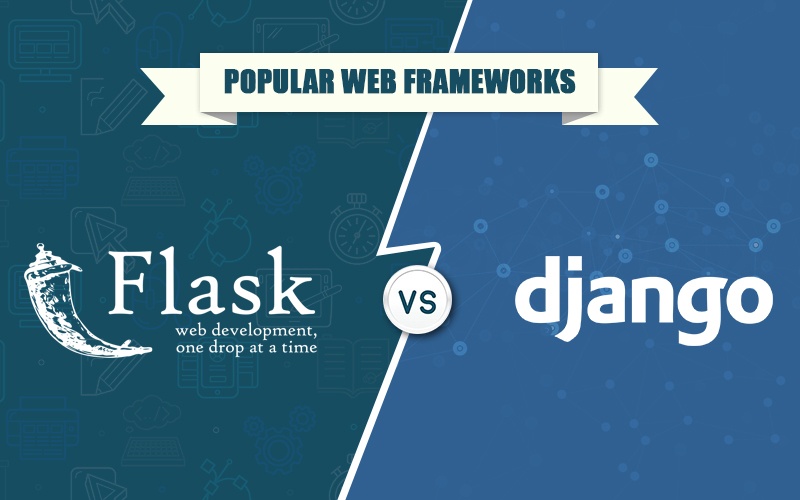Python is one of the best choices available today to build a web app. The readability and flexibility it offers have enabled it to be one of the most popular programming languages around.
The next task at hand would be choosing the best one from a wide range of Python web frameworks to successfully build your project in the fastest time possible. In most cases, the competition is between Django and Flask.
Since choosing the right framework is a crucial step towards building your dream web application with Python, we have provided an in-depth comparison of the two below.
Quick Intro
Flask
Flask is a microframework with the tagline “web development, one drop at a time”. The word ‘micro’ in microframework suggests that Flask is focused on simplicity, minimalism and fine-grained control.
Django
Developed and maintained by the Django Software Foundation (DSF), Django prides itself on being the “web framework for perfectionists with deadlines”. A Django course enables you to be much more advanced in web development as it adopts an all-inclusive approach by providing ORM (Object Relational Mapping), admin panel, database interfaces, and directory structure.
Get a Django certification today to boost your chances of landing yourself in a handsome web developer job.
Popularity
Stackoverflow
Django is a clear winner when it comes to Stackoverflow. At the time of writing this article, Django has 202,073 questions in Stackoverflow while Flask has 28,831 questions. The higher number for Django indicates its huge active developers’ community to help you when you get stuck.
Github Stats
Django currently has 42,643 stars, 2,171 watchers, and has been forked 18,364 times. On the other hand, Flask has 45,230 stars, 2,275 watchers, and has been forked 12,689 times. Though Flask has more stars, the higher number of forks indicate more active users in Django.
Projects
It can be easily observed that while Flask is often used just for API’s, Django is used as the main framework for powering many advanced applications. Pinterest, Disqus, Instagram and Bitbucket are just a few of the many popular apps powered by Django. On the other hand, companies like Twilio, Netflix, Linkedin and Uber use Flask for their API.
2. Development speed
Django equips developers with all the tools they need to quickly develop easily scalable, maintainable and reliable web apps as well as implement them. Complex web apps can now be developed in record time. At the same time, Flask can be used as an alternative by experienced programmers to create smaller web apps in short time frames due to its minimalistic and simple nature.
3. Maturity
Django was first released in 2005 and since then it has had numerous extensions, third-party apps and plugins covering a wide range of needs and thus making it a very mature framework. Flask is much younger when compared to Django, having been introduced in 2010. Therefore, it does not offer a wide range of options like Django.
4. Features
Django undoubtedly has more features than Flask. It offers components like the object-relational mapper, model-relational database, view- web templating system, controller- regex-based URL dispatcher, serialization, inheritance, caching, internationalization, middleware classes support and unit-testing framework.
It also boasts of useful bundled applications like an authentication system, admin interface, Atom and RSS syndication feeds, Google’s sitemaps, built-in mitigation and framework for GIS applications. Additionally, it has extensibility and supports server arrangements.
Flask, on the other hand, has features like development server, development debugger, inbuilt support for unit testing, Jinja2 templates, RESTful request dispatch, support for secure cookies, full WSGI compliant, Google app-based engine compatibility along with a modular and lightweight design.
5. Flexibility and Control
Minimalism and simplicity are the greatest strengths of Flask which ensure that developers face no restrictions. They can use a wide range of external libraries and add-ons and can implement anything they want in the exact same way, making it flexible and extensible. Django has modules and built-in features, thus offering far less freedom and control.
Choose the Right Framework to Build Your Web Application
Now that you have a detailed comparison of Django and Flask, it is your turn now to weigh in on these options and choose the right one according to the individual needs of your project. Consider the size of your project, its structure, type, customization, and future plans before deciding on a certain framework.
